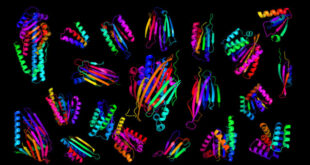A team of researchers led by the University of Edinburgh has grown human egg cells (oocytes) — which were removed from ovary tissue at their earliest stage of development — to the point at which they are ready to be fertilized. The research is published in the journal Molecular Human Reproduction.
Magnification of a lab-grown, fully matured human egg ready for fertilization. Image credit: University of Edinburgh.
In previous studies, scientists had developed mouse eggs to produce live offspring, and had matured human eggs from a relatively late stage of development.
The new study is the first time a human egg has been developed in the lab from its earliest stage to full maturity.
“Being able to fully develop human eggs in the lab could widen the scope of available fertility treatments,” said University of Edinburgh’s Professor Evelyn Telfer, corresponding author of the study.
“We are now working on optimizing the conditions that support egg development in this way and studying how healthy they are.”
“We also hope to find out, subject to regulatory approval, whether they can be fertilized.”
Professor Telfer and co-authors from the Center for Human Reproduction in New York, U.S., Royal Hospital for Sick Children in Edinburgh, UK, and the University of Edinburgh worked to develop suitable substances in which eggs could be grown — known as culture mediums — to support each stage of cell development.
Their findings, using tissue donated by women who were undergoing routine surgery, build on 30 years of research.
“The advance could safeguard the fertility of girls with cancer ahead of potentially harmful medical treatment, such as chemotherapy,” the researchers said.
“Immature eggs recovered from patients’ ovarian tissue could be matured in the lab and stored for later fertilization.”
“Conventionally, cancer patients can have a piece of ovary removed before treatment, but reimplanting this tissue can risk reintroducing cancer.”
_____
M. McLaughlin et al. Metaphase II oocytes from human unilaminar follicles grown in a multi-step culture system. MHR: Basic science of reproductive medicine, published online January 30, 2018; doi: 10.1093/molehr/gay002
 #Bizwhiznetwork.com Innovation ΛI |Technology News
#Bizwhiznetwork.com Innovation ΛI |Technology News




